It's about memory and aesthetics and environment.
I guess this is why I am a photographer -
it's easier for me to show you, not to tell you. - Brian Ferry
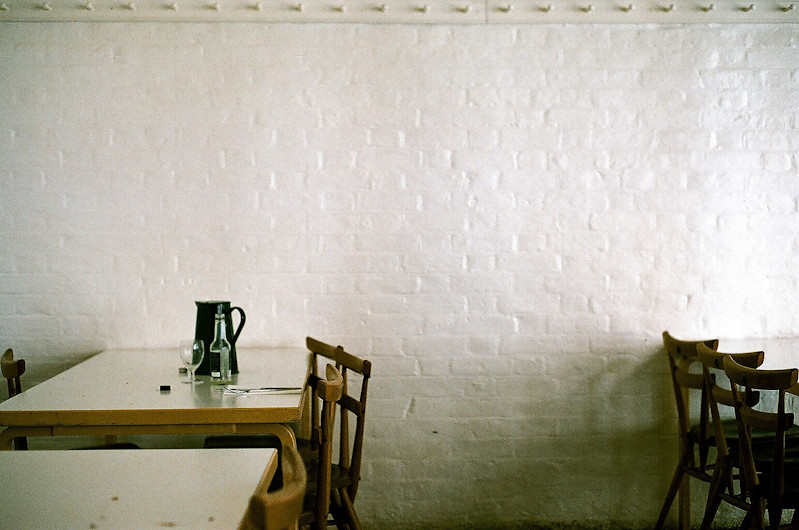
"Gotta find a way to get home strong, Gotta find a way back home
Gotta find the light to guide me along, Gotta find a a way back home
Gotta find a road that brings me back slow, Gotta find a way back home."
- Mojave 3, Bluebird of Happiness
I slowly became aware of Brian Ferry's photographs through his site, "the blue hour." His work captivated me for many reasons, one of them being the stillness he is able to capture on film. A certain moment of silence in the world, a moment that you might be lucky to catch if you are in a mindful state. His book, Quality of Life, he stated was "a desire to document the small and often seemingly unexceptional moments of day to day life, capturing these quietly beautiful details and making visual diary entries, allowing us to dwell on them with him." His photography has also been featured on Freunde von Freunden & Kinfolk magazine. Over the past year, Brian Ferry has transitioned from practicing law full-time to photography, working with various clients as Starbucks, and Rugby (Ralph Lauren).
On April 21 at St&ndard Goods, 7151 Beverly Blvd in Los Angeles, Brian will be in town for the opening of his photography show, entitled "This Is What Was Once All Yours," a collection of photos taken in the UK. It's now 6:45 a.m. here in Los Angeles as I am writing. The light is wrestling with the last touch of night, and it is now becoming time for "work." - David John
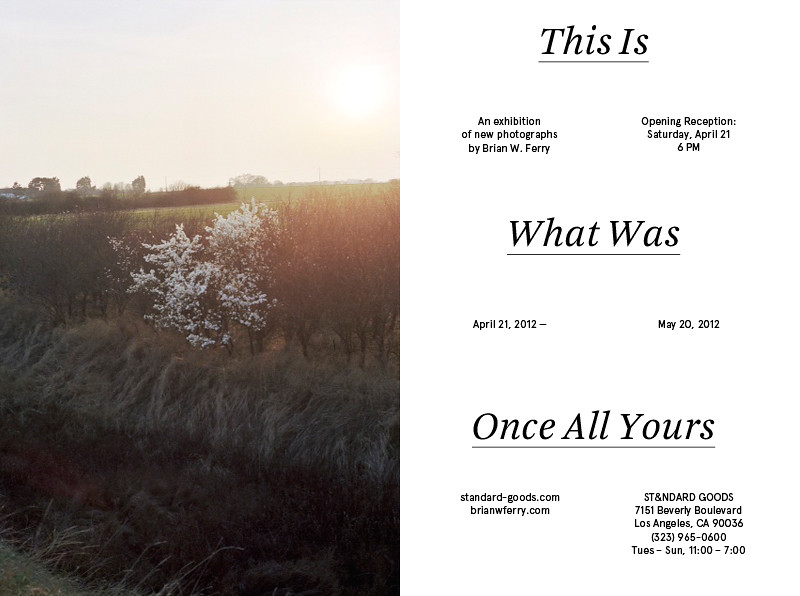
"This Is What Was Once All Yours." Where did this phrase come from?
Brian Ferry: "This Is What Was Once All Yours" is a line from a short story by Justin Taylor, included in his book "Everything here is the best thing ever." I read it a few months ago and wrote it down - I think it's such a loaded phrase. The line stuck with me and as I was thinking about the concept for this show, I saw my note and it immediately gave me an idea. Something about the phrase implies an active loss, rather than a passive one - where you have actively given something up. It also implies a sense of access and possession, but in the past tense. The photos for this show were all shot in the UK, where I lived from November 2009 to November 2011. I chose to move back to the US for a variety of reasons; it wasn't an easy decision and I've missed many things about my life in London since returning home. London felt like a city that really suited me in many ways. I returned for a 10-day visit in early March 2012 and I wanted to explore the idea of giving up my life in the UK - and what I had left behind. I knew that it would be interesting to return to England only a short time after moving back to the US. My hope was to capture some of the things that I left in the UK - not necessarily specific things (like my old flat or a favorite coffee shop) but more abstract, emotionally-charged stuff. There is a sense of nostalgia, perhaps - but I think it's more than that. I returned to England with a very different state of mind than when I left. It was important to allow myself to feel that change and hopefully let the change show in the photos I took. I wanted the work to explore change & transition and the mixed feelings that can accompany that.
Will you expand on the "more abstract, emotionally-charged stuff."
I wanted to capture something about the UK that is difficult to put into words for me - those subtle things that feel distinctive to me. It's about memory and aesthetics and environment. I guess this is why I am a photographer - it's easier for me to show you, not to tell you - I want to share a small part of my experience with you visually.
In the history of photography, are you carrying on any sort of tradition?
I don't really see myself as carrying on a tradition in the history of photography - I'm still quite new to this, comparatively speaking! While my work is probably more similar to the work of certain photographers rather than others, I don't see my work as fitting into a specific category.
My influences are varied and there are many photographers who influence me. I like Joel Meyerowitz and the way he tells stories about places & people and captures the essence of a moment and a place. His use of light & color is really influential. I am also influenced by Uta Barth and her more abstract photos of everyday things. I really admire her use of light & shadow and the way she incorporates lines & forms into her photographs. William Eggleston is also a big influence, as he is for many current photographers. Personally, I am most inspired by Eggleston's ability to find the extraordinary in the ordinary; this is something I try to do with my own photos.
There are many other people who influence me on a daily basis - and they aren't often big-name photographers. I'm influenced by other artists, designers, chefs, the way people live, the rhythms of daily life, the things I see and feel around me. Recently, I'm most influenced by photographers who are currently working and combining fine art photography and some commercial work in interesting ways.
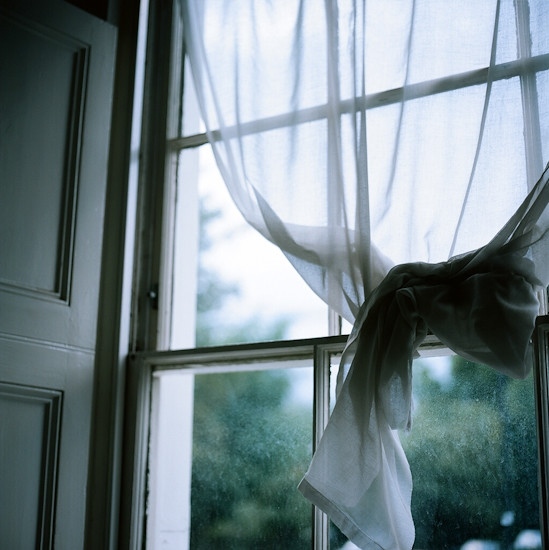
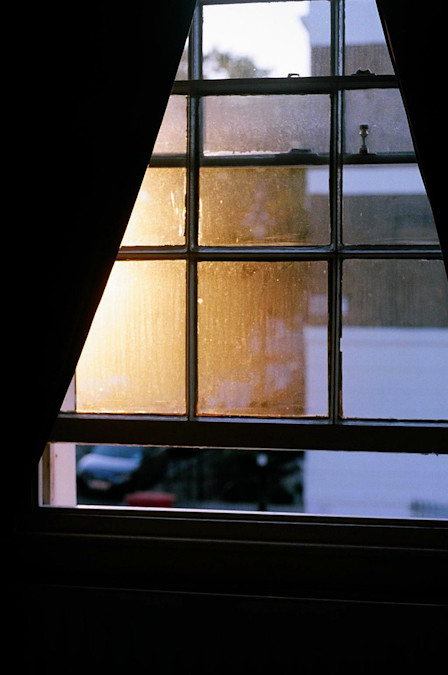
You recently made a career change from practicing law to being a full time photographer. Can you talk about this transition? Why was this change necessary?
I'm still in the midst of the transition, so perhaps I'll have wiser words in the future. I was a corporate lawyer whose passion was really photography - I shot photos every chance I had, it was a creative outlet that was absolutely necessary for my well-being. Over time, I came to understand that my heart was not in the job I had and I was unhappy. Nothing mattered more to me than pursuing photography full-time. Not the money I was giving up, or the stability (or the health insurance...). When you reach that point - when there is nothing that can hold you back from taking a leap of faith - then that leap seems less like a risk and more like a necessary and natural step forward. This is how it has been for me - I expected a rougher transition, but it has felt very natural. The life of a corporate lawyer and the life of a freelance photographer are, not surprisingly, very different. But photography was like my second job when I was practicing law. I was working on personal projects and small commissions quite often. It wasn't like I left my job and then decided to pick up a camera for the first time and try my hand at photography. So perhaps that's why the transition has felt natural - it is such a luxury to be able to devote myself fully to photography now.
Your photographs are documentations of...?
Experiences, the everyday, moods, moments, emotions, light.
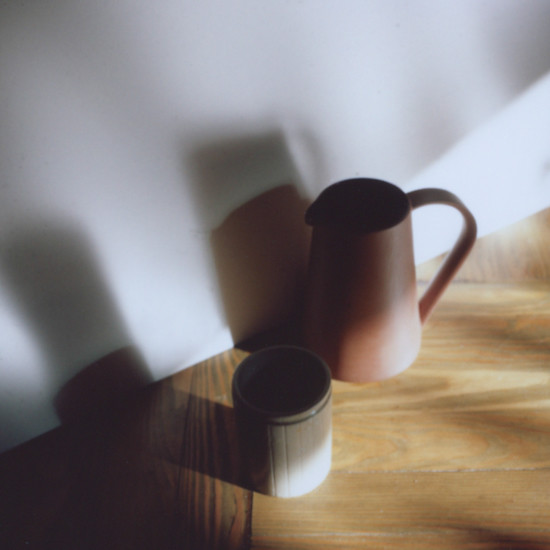
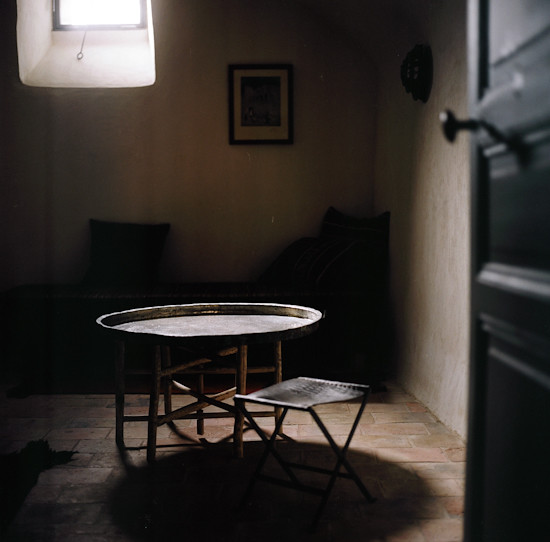
There is a sense of quiet, stillness, and an appreciation of shadows; a sense of darkness, of night approaching. What does it mean to capture something on film to you?
In a lot of my personal work up to this point, capturing these things on film means that I pause and reflect. I like to think of some of my photos as meditations. Usually, I'm going about my day and something stops me and causes me to pull out my camera. Maybe I've had a busy day and my mind is not really present, but in the evening I see this incredible pattern of light on the wall and it makes me feel something. I stop and try to capture that moment and that emotion. The emotion you may feel when you see my photo is different than what I felt, of course. But my intention is to make you do the same thing: stop, notice, think and feel something. Perhaps it's odd that a ray of light against my kitchen wall can stir some deeper feeling? It's the truth, though. Of course, often I see things that may not stir any emotion in me, but they still make me pause - a pattern, a shape or form, a color - and I snap a photo of that, too. It's about being mindful and truly seeing my environment and then translating that into my photographs.
How has the change from London to New York affected your work?
Well, a lot of my work is about observing my environment. And I'm less inspired by the city of New York than by the city of London. Some of this has to do with familiarity -- I've lived in NYC before and grew up in Connecticut. I have to look harder to find inspiration in my immediate surroundings here. Aesthetically, London was more inspiring to me and I felt I could simply walk around for the afternoon and never run out of things to shoot. Perhaps it's because London was always new and fresh to me - it was never too familiar. But I think this change is good for my work, it forces me to grow and learn and develop.
Your site, the blue hour, began? Has having an online site been instrumental in your career change?
'the blue hour' began in 2008 as a way to share my photography with friends & family and some online friends. It was my primary outlet for sharing my photography and to grow as an artist. Over time, it has attracted lots of people and I receive an incredible amount of support from people who follow the site.
My online site has been one of the most important factors in my photography and my career change. Taking photos and regularly posting them on my website kept me shooting, even when my job was insanely busy - and it helped me develop a body of personal work. Also, many photographic opportunities up to this point have come to me through my site, which is really incredible. For example, I had the opportunity to shoot an ad campaign for Starbucks in 2011 and their ad agency found me through my site. Such opportunities have given me confidence in my decision to change careers.
Why do you choose not to shoot digitally?
I will shoot digitally for commercial jobs and clients, or if it seems more appropriate for a certain photo. However, most of the time I shoot film. Part of it is the aesthetic - I like the way film looks, and digital photographs lack the depth & character of film. The tones and colors and the quality of light in a film photo can't be beat. I also like the process of shooting film - it's slower and more mindful, and it often involves less time on Photoshop after shooting! It's a refreshing process in our digital age.
Do you appreciate when photos are soft?
The level of softness or blur depends on the photo and what I am trying to capture. I do appreciate softness and a little grain in a photo - imperfections and quirks. This is one thing I love about shooting film and you will see that in my personal work. But there are other times when I really want a photo to be sharp and in focus. I tend to use certain cameras for those photos, like my Hasselblad - the lenses are meant to create crisp, beautiful images.
thank you Brian.
visit the blue hour.. ,
and Brian Ferry's portfolio
-------------------
